后殖民主义翻译理论
后殖民主义理论与翻译研究

二、葛兰西的“文化领导权”理 葛兰西的“文化领导权” 论(以《鲁滨逊漂流记》为例) 鲁滨逊漂流记》为例)
1、文化领导权的概念 (1)“统治”:西方的国家机器是一条 外围的壕堑,其身后具有一个由堡垒和 “阵地”组成的庞大体系,这个体系不 仅控制着本国的工人和其他从属阶级, 而且还以赤裸裸的暴力统治着一个高度 发达的社会。暴力统治是通过军队、警 察、法院等实现的;
(二)文本研究与文化政治批 二)文本研究与文化政治批 判策略
1、著作:《世界、文本、批评家》 2、观点: (1)种族中心主义和人对权力的欲望,是 文本与世界联系的根本内容。 (2)批评也是一个文本事件 ,文本批评 就是文化政治批判
(三)边缘性与失语症话语 三)边缘性与失语症话语
1、边缘性:后殖民主义理论的一大特 色 西方:普适真理与“东方应该怎样” 的权力指向(鲁滨逊的宗教文化殖 民) 东方(第三世界):边缘性(香蕉人 的尴尬) 后殖民:边缘到中心,边缘对中心的 消解
2、失语症话语 西方:话语的主动权与文化输出 权 东方:失语症候(尼玛斯人与 “星期五”) English/english
第一世界的西方操持着第一世界的“英 语”(English),而第三世界的批评家 或者后殖民地批评家使用的则是带有当 地语音和语法特征的第三世界“英语” (english),因此第三世界失去了话语 的主动权,成为一个“沉默的他者”。 无言的状态或失语状态说明“言说者的 缺席或被另一种力量强行置之于盲点之 中。”
佐哈尔:“任何多元系统,都是一个较大 的多元系统,即整体文化的组成部分; 同时,它又可能与其他文化中的对应系 统共同组成一个‘大多元系统’。…… 任何一个多元系统里面的现象,都不能 孤立地看待,而必须与整体文化甚至与 世界文化这个人类社会中最大的多元系 统中的现象联系起来研究。”
后殖民主义翻译理论代表人物

后殖民主义翻译理论代表人物后殖民主义理论“三巨子”斯皮瓦克的后殖民主义理论印度裔美国学者伽亚特里·斯皮瓦克的论文《殖民地民族也能讲话吗?》成为后殖民主义的纲领性文件。
在其著作中,斯皮瓦克认为,在修辞和逻辑之间获得认知的条件和效应之间存在着不协调关系,这种关系为能动者构建世界的关系,如此能动者才可有伦理的行为、政治的行为并有可能在世界上以人的方式生存。
不为另一种语言构建这样的一个模式就不可能有真正的翻译。
后殖民主义理论认为处理这种模式的方式在殖民者语言和前殖民地语言中是不同的,从英语到第三世界语言和从第三世界语言到英语的翻译是两种不同的政治活动,在前者的活动中往往会不自觉地接受殖民者的态度,而在后者的活动中民主法则往往会变为强权法则。
赛义德的东方主义理论巴勒斯坦裔美国学者赛义德通过对文学文本的解读,揭示了文学与权力的同谋关系。
他在其著作《东方学》中指出“如果我们同意历史上的任何事物,像历史本身一样,都是人所创造的,那么,我们就会明白,对许多物体、地点或时代而言,人们赋予它的角色和意义,为什么只有在其被赋予之后才可能获得客观有效性”。
赛义德在一系列后殖民理论中坚持了对于西方中心主义的批判及对于文化霸权的揭露。
意识形态总是与特殊利益联系在一起,或者说意识形态之所以为“颠倒意识”、“虚假意识”,根本原因在于特殊利益被当做普遍的痛惜加以辩护。
无疑,西方作家在描绘涉及东方的文学文本中存在着民族阶级意识的偏见。
巴巴的后殖民主义理论波斯裔美国学者霍米·巴巴著有《民族和叙述》《文化的定位》和《全球的尺度》等后殖民主义研究著作。
其后殖民主义理论代表了当代西方后殖民主义理论批评发展的最新阶段,即全球化时代的后殖民批评。
这种批评的特征在于通过其混杂策略消解了西方帝国的文化霸权,实现了第三世界批评从边缘向中心的运动,导致了文化多样性的真正实现。
巴巴的批评理论的建树主要体现在:(1)将马克思主义和后结构主义糅为一体,发展了一种颇具挑战性和解构性的后殖民文化批判风格;(2)他的混杂理论影响了当前国际学术界对文化身份认同和少数族裔的研究,提出了第三世界批评家发出自己声音的具体策略;(3)他的模拟概念对于第三世界批评家的反对西方霸权的努力有着巨大的启迪作用:(4)他所发展出的一种文化翻译理论强有力地冲击了翻译研究领域内的语言中心主义模式。
后殖民时代翻译理论发展课件

详细描述
某影视作品字幕翻译的后殖民理论分析
要点一
总结词
要点二
详细描述
该案例以某影视作品字幕翻译为例,探讨了后殖民翻译理 论在影视翻译中的应用。
该案例首先介绍了影视作品的文化背景和受众特点,然后 分析了字幕翻译中遇到的文化差异和语言障碍。通过对比 原版和译版的字幕,探讨了后殖民翻译理论在影视翻译中 的具体应用,并总结了其对影视作品传播和文化交流的意义。
某国际会议口译中的后殖民翻译实践分析
总结词
详细描述
THANK YOU
发展阶段
20世纪80年代,后殖民翻译理论 逐渐形成,强调翻译的政治性和 文化交流的重要性。
成熟阶段
20世纪90年代至今,后殖民翻译 理论进一步发展,与多元文化主 义、跨文化交际等理论相互融合, 形成了更加完善的理论体系。
主要代表人物及其观点
代表人物1 代表人物2 代表人物3
02
后殖民翻译理论的核心观点
强调文化交流与对话 重视译者的主体性 拓展翻译研究的视野
对中国翻译实践的指导意义
尊重源文化
01
跨文化传播意识
02
译者的跨文化能力
03
对中国翻译教育的影响与改革
强化跨文化交际能力的培养 增加多元文化和全球视野的课程 加强实践环节和实践教学
06
后殖民翻译理论案例分析
某部文学作品的后殖民翻译分析
总结词
影视字幕翻译
影视字幕翻译是后殖民翻译理论应用的一个重要领域。 在影视字幕翻译中,译者需要将原声影视作品中的对 话和声音翻译成目标语言的字幕,同时还要保持字幕 的流畅性和可读性。
后殖民翻译理论在影视字幕翻译中的应用主要体现在对 原声影视作品的文化背景和语言风格的尊重上。例如, 在翻译包含特定文化意象或口音的影视作品时,译者需 要对其进行适当的解释和注释,以帮助目标观众更好地 理解原作的文化内涵和语言表达方式。
后殖民主义与当代翻译理论研究论文
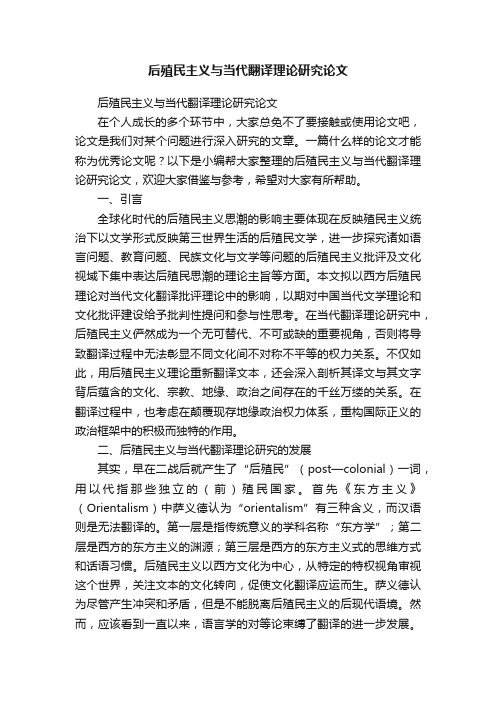
后殖民主义与当代翻译理论研究论文后殖民主义与当代翻译理论研究论文在个人成长的多个环节中,大家总免不了要接触或使用论文吧,论文是我们对某个问题进行深入研究的文章。
一篇什么样的论文才能称为优秀论文呢?以下是小编帮大家整理的后殖民主义与当代翻译理论研究论文,欢迎大家借鉴与参考,希望对大家有所帮助。
一、引言全球化时代的后殖民主义思潮的影响主要体现在反映殖民主义统治下以文学形式反映第三世界生活的后殖民文学,进一步探究诸如语言问题、教育问题、民族文化与文学等问题的后殖民主义批评及文化视域下集中表达后殖民思潮的理论主旨等方面。
本文拟以西方后殖民理论对当代文化翻译批评理论中的影响,以期对中国当代文学理论和文化批评建设给予批判性提问和参与性思考。
在当代翻译理论研究中,后殖民主义俨然成为一个无可替代、不可或缺的重要视角,否则将导致翻译过程中无法彰显不同文化间不对称不平等的权力关系。
不仅如此,用后殖民主义理论重新翻译文本,还会深入剖析其译文与其文字背后蕴含的文化、宗教、地缘、政治之间存在的千丝万缕的关系。
在翻译过程中,也考虑在颠覆现存地缘政治权力体系,重构国际正义的政治框架中的积极而独特的作用。
二、后殖民主义与当代翻译理论研究的发展其实,早在二战后就产生了“后殖民”(post—colonial)一词,用以代指那些独立的(前)殖民国家。
首先《东方主义》(Orientalism)中萨义德认为“orientalism”有三种含义,而汉语则是无法翻译的。
第一层是指传统意义的学科名称“东方学”;第二层是西方的东方主义的渊源;第三层是西方的东方主义式的思维方式和话语习惯。
后殖民主义以西方文化为中心,从特定的特权视角审视这个世界,关注文本的文化转向,促使文化翻译应运而生。
萨义德认为尽管产生冲突和矛盾,但是不能脱离后殖民主义的后现代语境。
然而,应该看到一直以来,语言学的对等论束缚了翻译的进一步发展。
因此,在当今世界经济全球化和文化多元化的背景下,文化翻译比语言学翻译更具现实的进步性。
后殖民主义翻译理论
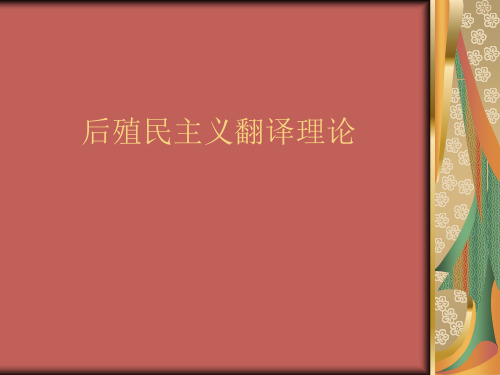
斯皮瓦克(Gayatri Spivak):
印度裔美国学者 结合女性主义、解构主义、马克思主义,以 性别、种族、阶级为分析代码,对殖民地的 权力话语进行深入揭露,对文化帝国主义的 种族中心主义进行批判,进而对臣属文化重 新命名。 代表作:Of Grammatology (1976,trans.), In Other Worlds: Essays in Cultural Politics (1988), Outside in the Teaching Machine (1993)
代表人物及其主要观点
尼兰贾娜 (Tejaswini Niranjana): 印度裔美国学者 认为翻译自始至终都是个政治行为, 翻译中隐含的权力关系仍旧是原殖民 者对后殖民地人民进行“象征控制” 的场所,呼吁对翻译重新定位。 代表作:Siting Translation: History, Post-structuralism, and the Colonial Context (1992)
混杂性(hybridity) 巴巴成功地将“混杂性”这一术语引 入了文化研究领域,并使之成为后殖 民批评不可或缺的重要概念。混杂性 是指由殖民化产生的接触区内新的跨 文化形式。巴巴认为,异质文化间的 碰撞是一种话语实践。巴巴试图通过 混杂性策略颠覆殖民话语权威,从而 揭示殖民化过程中被殖民文化与殖民 权力互动中产生的种种矛盾现象。
霍米· 巴巴(Homi Bhabha):
波斯裔美国学者 张扬第三世界文化理论,主张异质文 化,特别是弱势文化,通过沟通与转 化,渗入到对殖民者文化的复制中, 解构其话语权威,从而使第三世界文 化获得自身的合法性。 代表作:The Location of Culture (1994)
二.后殖民主义翻译理论
Postcolonial Translation Theory后殖民主义翻译理论

后殖民翻译研究将翻译纳入到国际政治文化
的框架之中,注重分析蕴涵在翻译文本中的 权力关系和历史语境,探索翻译在帝国主义 文化霸权的建构和解构过程中的作用,强调 翻译的文化和政治功能,对传统翻译研究构 成了巨大的挑战,为新世纪的翻译研究提供 了全新的视角和思维空间。
首先,后殖民主义翻译理论尚未形成一套完整 的翻译理论体系。印度或 巴西等国的后殖民主义翻译理论体系虽然形成了一定的规模,具有相当 大的影响力和指导性,但是这些理论只是针对某一个具体的国家、具体 的文化或是具体的领域而形成的翻译理论,许多国家虽然或多或少都受 到了殖民的影响,但殖民的程度各不相同。 其次,后殖民主义翻译理论旨在揭露第一世界与第三世界在翻译中形成的 不平等的关系和秩序,旨在通过理论研究揭示这种权力差异并通过努力消 解这种差异,进而达到各种翻译文化的平等共处。但是,后殖民主义翻译 理论对这种权力差异的过分强调容易使第三世界人们产生对西方文化的 敌视,导致狭隘的民族主义情绪和对西方文化强烈的抵制情绪,进而导致 文化保守主义和文化自恋情结,阻碍东西方文化之间的有益交流,不利于 多元文化的共同发展,这便背离了后殖民主义翻译理论的初衷。 最后,后殖民主义翻译理论仅从后殖民主义的视角强调东方对西方文化霸 权的对抗,但是却忽视或是回避了东西方文化差异的根本原因。其实,东 西方文化间形成的权力差异是多方面的,不仅有其历史原因,也与经济、 政治以及文化传统都有紧密的关系。虽然有的后殖民主义翻译理论或多 或少的对其他的影响因素也做了论述,但还是没有给予其足够的重视,没 有进行全面地论述。
铁木志科 (Maria Tymczko): 通过分析翻译在爱尔兰民族文化复兴和爱尔兰的政治独立过
程中所起的重要作用,认为翻译与意识形态,政治斗争等密 切相关,是殖民地人民反殖民斗争的重要武器。 代表作:Translation in a Postcolonial Context: Early Irish Literature in English Translation (1999)
后殖民翻译理论

后殖民翻译理论浅析摘要:翻译,作为一种实践活动,在人类的文化交流中广泛的进行着。
自翻译诞生以来,同它紧密相连的大多是意义、对等、技巧、精确等概念。
20世纪80年代中后期,翻译研究产生了一个全新视角,即后殖民翻译理论。
在本文中,笔者以道格拉斯?罗宾逊的《翻译与帝国:后殖民理论解读》一书为例,讨论了后殖民翻译理论研究的内容以及这一理论的意义和局限性。
关键词:后殖民主义;翻译帝国政治中图分类号:h059 文献标识码:a 文章编号:1006-026x (2012)07-0000-01一.引言“后殖民主义”这一术语是在斯皮瓦克(gayatri spivak)1990年出版的访谈与会议及《后殖民批评家》中正式提出的。
而“后殖民翻译研究”是由美国学者道格拉斯?罗宾逊(douglas robinson)于1997年提出。
道格拉斯?罗宾逊(douglas robinson),当代西方译学界十分有影响力的翻译理论家。
他执教于美国密西西比大学英语系,从事翻译实践与理论研究。
研究范围广泛,其研究领域包括翻译、文学、语言学、文化、教学法等领域。
其翻译思想极具创见意义,在译学方面有独树一帜的论述。
罗宾逊著述颇丰,现已出版近十本专著,并已发表33篇与翻译理论和教学相关的学术论著。
他著有:《译者登场》(the translator turn,1991),《翻译与禁忌》(translation and taboo,1996),《谁在翻译?》(who translates:translator subjectivities beyond reason,2001)等著作。
1997 年,道格拉斯?罗宾逊出版了《翻译与帝国:后殖民理论的解释》(translation and empire:postcolonial theories explained)。
二.后殖民翻译研究后殖民翻译研究源于后殖民理论。
后殖民理论是一种多元文化理论,主要研究殖民时代结束后宗主国与殖民地之间的文化、话语权力的关系,以及有关种族主义、文化帝国主义等问题。
后殖民主义翻译理论
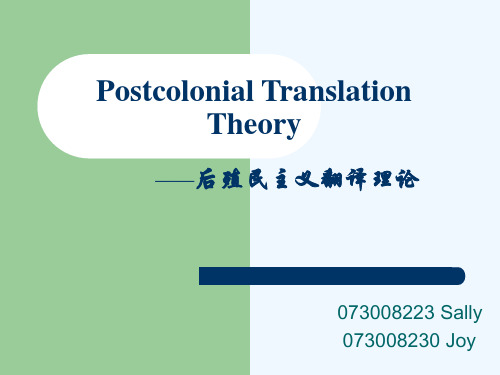
Example 2
真是天不测风云,人有旦夕祸福。(《红楼梦》 第十一回) I know “the weather and human life are both unpredictable”…..(Hawkes,1973:155) Truly, “storms gather without warning in nature, and bad luck befalls men overnight”……(the Yangs,1978:231)
后殖民主义翻译理论
后殖民主义翻译研究始于 20世纪 80年代,是建立在解 构主义、 阐释学、 多元系统论、 描写主义、 目的论 和新历史主义基础上的翻译研究的新视角。该理论“从 后殖民主义理论视角审视不同历史条件下的翻译行为, 关注隐藏在译文背后的两种文化间的权力争斗和权力运 作,认为不同文化间存在着权力差异,不同文化间从未有 过真正平等的对话” 。由于后殖民语境下存在着政治 经济的不平等,便产生了强势文化与弱势文化之间的权 力差异,翻译难以实现人们预期的平等对话和信息转换。
巴巴
波斯裔美国学者霍米· 巴巴后殖民批评理论代 表了当代西方后殖民主义理论批评发展的最新 阶段,即全球化时代的后殖民批评。这种批评 的特征在于通过其混杂策略消解了西方帝国的 文化霸权,实现了第三世界批评从边缘向中心 的运动,导致了文化多样性的真正实现。
异化
异化指的是根据既定的语法规则按字面意思将 和源语文化紧密相连的短语或句子译成目标语。 为了挑战英美文化中一直被认为是唯一有效的 归化翻译法,Lawrence Venuti提出了‘抵抗式’ 翻译理论,即异化的翻译策略,使异语读者和 译者摆脱来自强势文化的各种限制”。
例 3.
后殖民主义翻译理论对中国翻译研究的启示
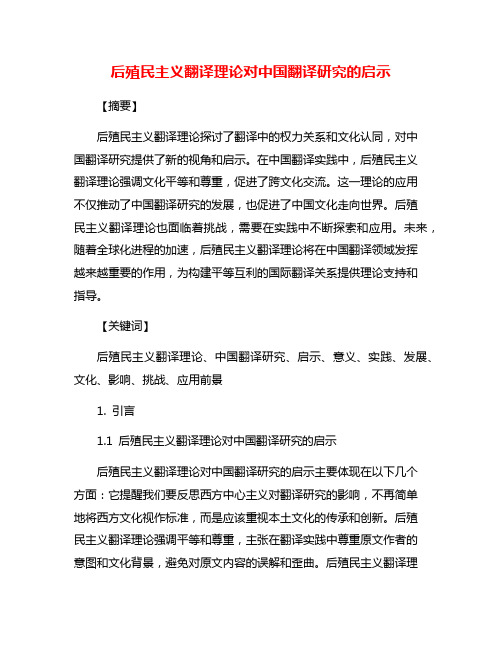
后殖民主义翻译理论对中国翻译研究的启示【摘要】后殖民主义翻译理论探讨了翻译中的权力关系和文化认同,对中国翻译研究提供了新的视角和启示。
在中国翻译实践中,后殖民主义翻译理论强调文化平等和尊重,促进了跨文化交流。
这一理论的应用不仅推动了中国翻译研究的发展,也促进了中国文化走向世界。
后殖民主义翻译理论也面临着挑战,需要在实践中不断探索和应用。
未来,随着全球化进程的加速,后殖民主义翻译理论将在中国翻译领域发挥越来越重要的作用,为构建平等互利的国际翻译关系提供理论支持和指导。
【关键词】后殖民主义翻译理论、中国翻译研究、启示、意义、实践、发展、文化、影响、挑战、应用前景1. 引言1.1 后殖民主义翻译理论对中国翻译研究的启示后殖民主义翻译理论对中国翻译研究的启示主要体现在以下几个方面:它提醒我们要反思西方中心主义对翻译研究的影响,不再简单地将西方文化视作标准,而是应该重视本土文化的传承和创新。
后殖民主义翻译理论强调平等和尊重,主张在翻译实践中尊重原文作者的意图和文化背景,避免对原文内容的误解和歪曲。
后殖民主义翻译理论鼓励多元文化之间的对话与交流,倡导在跨文化交流中保持文化多样性和文化认同。
后殖民主义翻译理论对中国翻译研究的启示是多方面的,它为中国翻译研究提供了新的思路和方法,促进了中国翻译研究的发展与进步。
在未来的研究中,我们应积极借鉴后殖民主义翻译理论的观点,不断拓展研究领域,推动中国翻译研究走向更加多元化和国际化的方向。
2. 正文2.1 后殖民主义翻译理论的基本观点后殖民主义翻译理论认为翻译不仅仅是简单的语言转换,更应当被看作是文化传递和权力关系的重要手段。
翻译不仅仅是为了传达原文的意思,更是在不同文化和权力结构之间进行交流和表达。
后殖民主义翻译理论关注翻译中的政治和权力问题,强调翻译的背景和条件对翻译结果的影响。
翻译者的文化身份、政治立场、社会地位等因素都会对翻译产生重要影响,因此翻译不应被视为中立客观的行为。
后殖民理论【后殖民视角下的翻译研究】
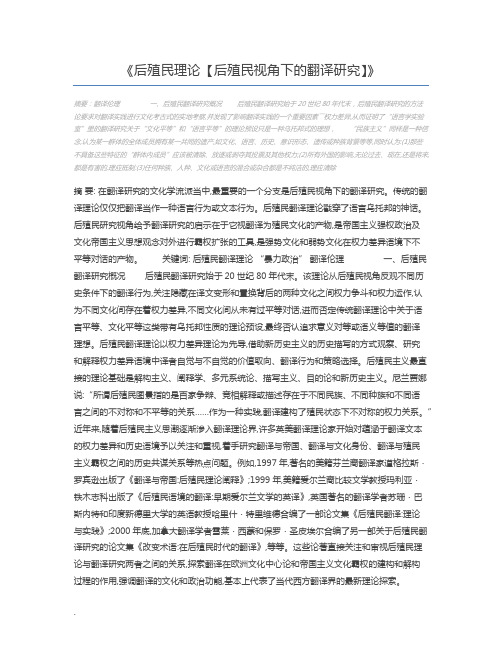
《后殖民理论【后殖民视角下的翻译研究】》摘要:翻译伦理一、后殖民翻译研究概况后殖民翻译研究始于20世纪80年代末,后殖民翻译研究的方法论要求对翻译实践进行文化考古式的实地考察,并发现了影响翻译实践的一个重要因素――权力差异,从而证明了“语言学实验室”里的翻译研究关于“文化平等”和“语言平等”的理论预设只是一种乌托邦式的理想,“民族主义”同样是一种信念,认为某一群体的全体成员拥有某一共同的遗产,如文化、语言、历史、意识形态、遗传或种族背景等等,同时认为:(1)那些不具备这些特征的“群体内成员”应该被清除、放逐或剥夺其投票及其他权力;(2)所有外国的影响,无论过去、现在,还是将来,都是有害的,理应抵制;(3)任何种族、人种、文化或语言的混合或杂合都是不纯洁的,理应清除摘要: 在翻译研究的文化学流派当中,最重要的一个分支是后殖民视角下的翻译研究。
传统的翻译理论仅仅把翻译当作一种语言行为或文本行为。
后殖民翻译理论戳穿了语言乌托邦的神话。
后殖民研究视角给予翻译研究的启示在于它视翻译为殖民文化的产物,是帝国主义强权政治及文化帝国主义思想观念对外进行霸权扩张的工具,是强势文化和弱势文化在权力差异语境下不平等对话的产物。
关键词: 后殖民翻译理论“暴力政治” 翻译伦理一、后殖民翻译研究概况后殖民翻译研究始于20世纪80年代末。
该理论从后殖民视角反观不同历史条件下的翻译行为,关注隐藏在译文变形和置换背后的两种文化之间权力争斗和权力运作,认为不同文化间存在着权力差异,不同文化间从未有过平等对话,进而否定传统翻译理论中关于语言平等、文化平等这类带有乌托邦性质的理论预设,最终否认追求意义对等或语义等值的翻译理想。
后殖民翻译理论以权力差异理论为先导,借助新历史主义的历史描写的方式观察、研究和解释权力差异语境中译者自觉与不自觉的价值取向、翻译行为和策略选择。
后殖民主义最直接的理论基础是解构主义、阐释学、多元系统论、描写主义、目的论和新历史主义。
后殖民主义翻译理论下翻译的归化与异化现象

后殖民主义翻译理论下翻译的归化与异化现象一、引言最近十多年来,翻译中的归化与异化问题一直是国内翻译学者讨论的热门话题。
纵览国内许多翻译期刊,论述翻译问题时涉及到的归化与异化问题众多。
但是,总体看来,大多数论述似乎都从传统的译论角度出发,只是将归化与异化限定在对文本的语言学认识范畴的基础上进行单向的研究。
当今世界的全球化使得各国的文化交流越来越频繁,而翻译学作为跨文化交际的一门重要学科,在人类的交往方面发挥的作用日益突出。
翻译不仅仅要考虑到文本因素,还应该结合文本考虑其外部的政治、社会、文化语境等因素。
苏珊·巴斯内特和哈瑞什·特里维蒂认为“翻译总是植根于文化和政治体系以及历史当中”“译者采用的翻译策略反映了译本产生的语境”(曲夏瑾、金敏芳,2011:48)。
后殖民主义翻译理论是一种带有很强意识形态色彩的文化批评理论,它关注强势文化与弱势文化的交流与互动关系。
它的提出给翻译研究带来了新启示,将翻译活动回置于它所产生的真实的历史文化背景之中。
因此在后殖民主义理论这一大背景下,研究翻译的归化与异化问题显得十分有必要。
二、后殖民主义翻译理论后殖民主义翻译理论作为一种文化批评理论始于20世纪70年代,它是建立在解构主义、阐释学、多元系统论、描写主义、目的论和新历史主义基础上的翻译理论。
后殖民翻译研究理论给予翻译研究的启示在于它视“翻译为殖民文化的产物,是强势文化和弱势文化在权力差异语境中不平等对话的产物”(王东风,2003:4)。
后殖民翻译研究关注弱势民族、弱势文化和弱势群体,以文化生态平衡和世界多元文化为视角,努力创造世界文化多样性。
这一翻译理论的提出使得翻译研究不再局限于语言、文体和风格等文本内部问题,一大批原先热衷于探讨翻译技巧的学者也逐渐将目光转向非文本因素,比如社会、政治和意识形态等。
至此,翻译研究经历了“文化转向”“权力转向”,权力关系后来成为后殖民主义理论和翻译研究共同关注的焦点。
后殖民主义翻译理论代表人物

后殖民主义翻译理论代表人物后殖民主义理论“三巨子”斯皮瓦克的后殖民主义理论印度裔美国学者伽亚特里·斯皮瓦克的论文《殖民地民族也能讲话吗?》成为后殖民主义的纲领性文件。
在其著作中,斯皮瓦克认为,在修辞和逻辑之间获得认知的条件和效应之间存在着不协调关系,这种关系为能动者构建世界的关系,如此能动者才可有伦理的行为、政治的行为并有可能在世界上以人的方式生存。
不为另一种语言构建这样的一个模式就不可能有真正的翻译。
后殖民主义理论认为处理这种模式的方式在殖民者语言和前殖民地语言中是不同的,从英语到第三世界语言和从第三世界语言到英语的翻译是两种不同的政治活动,在前者的活动中往往会不自觉地接受殖民者的态度,而在后者的活动中民主法则往往会变为强权法则。
赛义德的东方主义理论巴勒斯坦裔美国学者赛义德通过对文学文本的解读,揭示了文学与权力的同谋关系。
他在其著作《东方学》中指出“如果我们同意历史上的任何事物,像历史本身一样,都是人所创造的,那么,我们就会明白,对许多物体、地点或时代而言,人们赋予它的角色和意义,为什么只有在其被赋予之后才可能获得客观有效性”。
赛义德在一系列后殖民理论中坚持了对于西方中心主义的批判及对于文化霸权的揭露。
意识形态总是与特殊利益联系在一起,或者说意识形态之所以为“颠倒意识”、“虚假意识”,根本原因在于特殊利益被当做普遍的痛惜加以辩护。
无疑,西方作家在描绘涉及东方的文学文本中存在着民族阶级意识的偏见。
巴巴的后殖民主义理论波斯裔美国学者霍米·巴巴著有《民族和叙述》《文化的定位》和《全球的尺度》等后殖民主义研究著作。
其后殖民主义理论代表了当代西方后殖民主义理论批评发展的最新阶段,即全球化时代的后殖民批评。
这种批评的特征在于通过其混杂策略消解了西方帝国的文化霸权,实现了第三世界批评从边缘向中心的运动,导致了文化多样性的真正实现。
巴巴的批评理论的建树主要体现在:(1)将马克思主义和后结构主义糅为一体,发展了一种颇具挑战性和解构性的后殖民文化批判风格;(2)他的混杂理论影响了当前国际学术界对文化身份认同和少数族裔的研究,提出了第三世界批评家发出自己声音的具体策略;(3)他的模拟概念对于第三世界批评家的反对西方霸权的努力有着巨大的启迪作用:(4)他所发展出的一种文化翻译理论强有力地冲击了翻译研究领域内的语言中心主义模式。
后殖民地

后殖民主义翻译理论是在后殖民批评语境下所建构的一系列有关翻译的概念、判断和喻说。
后殖民主义翻译理论主要关注翻译在殖民化过程中所撒播的权力机制以及随之而来的一系列抵抗的历史、挪用的历史、间隙的空间、分裂的空间等,是翻译理论研究中不可或缺的文化批评话语。
后殖民主义介入翻译研究,直接促使了翻译研究文化转向的发生,使翻译学研究由传统的语言学范式转向文化范式,即对影响翻译活动的外部历史环境因素如社会文化、政治、权力和意识形态等的研究。
总的来说,后殖民主义理论就是对帝国主义文化霸权的消解和批判,而后殖民主义翻译理论则是在翻译研究领域内推广以解构主义为中心的各种后结构主义理论。
消解了翻译过程中文本、作者和译者的中心地位,把目光放在了意识形态和文化政治方面。
- 1、下载文档前请自行甄别文档内容的完整性,平台不提供额外的编辑、内容补充、找答案等附加服务。
- 2、"仅部分预览"的文档,不可在线预览部分如存在完整性等问题,可反馈申请退款(可完整预览的文档不适用该条件!)。
- 3、如文档侵犯您的权益,请联系客服反馈,我们会尽快为您处理(人工客服工作时间:9:00-18:30)。
二〇一五届学生毕业论文(设计)题目:THE ANALYSIS ON THE TRANSLATORS’ SUBJECTIVITY FROM THE PERSPECTIVE OF THE POSTCOLONIAL TRANSLATION THEORY系别:外国语学院专业:英语班级:11级5班学号:110511姓名:李阳指导教师:周金凤完成时间:2015 年 5 月 10 日后殖民主义翻译理论视角下译者主体性分析摘要译者主体性的问题是后殖民主义翻译理论要探讨的重要话题。
尤其在当下,经济全球化和民族文化多元化已是时代的主要特征,并将继续得到发展,不同主体间的文化交往也将不断得到加强,因此关注后殖民主义翻译理论下译者的主体性,将使我们能够在文化多元化,经济全球化的今天,找到一条解决后殖民主义翻译理论下译者主体性之困境的新的有效途径。
本文是从后殖民主义翻译理论视角下看译者的主体性,后殖民主义翻译理论认为原作与译者处于相互依存的共生关系之中,翻译所必然涉及到的文化上的差异和表述上的困境,使得任何翻译都注定不同程度的存在着对原作的再创造。
本文在第一部分中主要阐述了后殖民主义翻译理论的基本概况以及对中国翻译的影响。
第二部分着重对译者主体性的分析,译者主体地位的隐与显及影响译者主体性发挥的因素。
本文最后一部分主要结合前两部分内容对后殖民主义翻译理论视角下译者主体性进行剖析,主要从殖民译者主体性和被殖民译者主体性两方面阐述了后殖民主义翻译理论视角下译者主体性的困境及其出路。
关键词:后殖民主义;译者主体性;归化;异化;困境THE ANALYSIS ON THE TRANSLATORS’ SUBJECTIVITY FROM THE PERSPECTIVE OF THE POSTCOLONIALTRANSLATION THEORYABSTRACTThe problem of the translators' subjectivity is the main topic to explore under the postcolonial translation theory. Especially in the present, the economic globalization and the pluralism of national culture are the main characteristics of the times, and they will continue to develop. The cultural exchanges between different subjects will also be continuously strengthened, which allow us to find a solution by examining the postcolonial translation theory of socialism under the new effective ways of dilemma of translators' subjectivity in the cultural diversity, economic globalization today.This article studies the subjectivity of the translator from the perspective of postcolonial translation theory.Postcolonial translation theory thinks that the original work and translator is in an interdependent symbiotic relationship. Translation makes any translation is destined to exist different degrees of re-creation of the original work and that‟s because of the cultural and expression difference.In the first part of this paper mainly expounds the basic situation of the postcolonial translation theory and its influence on Chinese translation. The second part focuses on the analysis of the subjectivity of the translator, explicitation and implicitation of translator's subjectivity and the influence factors of the translator's subjectivity. The last part is to analyse the translators‟ subjectivity from the perspective of the postcolonial translation theory which bases on the previous two part, and it mainly elaborates predicament and the solution of translators‟ subjectivity from the perspective of the postcolonial translation theory.Key words:postcolonial;Translators'subjectivity;domestication;foreignization; predicamentCONTENTS摘要 (I)Abstract (II)Contents .................................................................................................................................... I II Introduction .. (1)1 Postcolonial translation theory (2)1.1 Outline of postcolonial translation theory (2)1.1.1 The rise and development of postcolonial translation theory (2)1.1.2 Power relations under the postcolonial translation theory (2)1.1.3 Politics in postcolonial translation theory (3)1.2 Domestication and foreignization in postcolonial translation theory (3)1.2.1 Domestication and foreignization in the postcolonial translation (3)1.2.2 Different choices of translation strategies: domestication and foreignization (4)1.3 The significance of postcolonial translation theory (5)1.4 Effect of postcolonial translation theory to translation study in the Chinese (6)2 Analysis of translators' subjectivity (7)2.1 The definitions of translators' subjectivity (7)2.2 Explicitation and implicitation of Translator's Subjectivity (7)2.2.1 Invisibility of translator and the translator's subjectivity (7)2.2.2 Cultural turn and visibility of translator's subjectivity (8)2.3 The factors influencing translator's subjectivity (8)2.3.1 Language Proficiency (8)2.3.2 Ethics and Moral Values (8)2.3.3 Social and Cultural Stance (9)2.3.4 Translation Motivation. (10)2.4 Translator's subjectivity in China (10)3 An Analysis on the Translators‟ Subjectivity from the Perspective of th e Postcolonial Translation Theory (11)3.1 The performance of the translators‟ subjectivity from the perspective of thepostcolonial translation theory (11)3.1.1 Translator's subjectivity decides the choice of translation text (11)3.1.2 The reflection of translators' subjectivity reflect in the choice of translationmethods (12)3.1.3 The reflection of translators' subjectivity reflect in the translation of “culturalhybridity” (13)3.2 Predicamen and the solution of translators‟ subjectivity from the perspective of thepostcolonial translation theory (13)3.2.1 The subjectivity of the colonial translator (13)3.2.2 The subjectivity of the colonized translator (14)3.2.3 The solution the predicament of translators' subjectivity (15)3.3 The influence to Chinese translation from translators‟ subjectivity from the perspectiveof the postcolonial translation theory (16)Conclusion ................................................................................................................................ 18 BibliographyAcknowledgementsIntroductionTranslation as a kind of social activity of human beings has existed for thousands of years, the study on it is a relatively new discipline. At the early stages of translation study, more attention was paid to the activity itself. Such questions “what is the criteria of translation”, “what kind of approaches should be adopted in translating” and etc.were the focus of discussion. The role of the translator was totally ignored.Translation is a complicated communicative art, no one doubts the importance of it. It is well known that translators subjectivity in translation in translating practice of part of the indispensable and irreplaceable.In the west after 1970 years, influenced by the "cultural turn", pay attention to the subject of translation has been more and more. The translator is no longer considered inferior to the original author, but as a creative theme and original works of translation in the afterlife. The status of translators and translated works has been greatly enhanced. Therefore, translators have moved to the forefront and assumed some subjective roles.Translators' subjectivity is abstract, it reflected in the decision making process, especially in the about strategy should be taken to the choice of the translator in the translation. There are two main translation strategies: foreignization and domestication. The former is source culture-oriented and the latter is target culture-oriented. The translator‟s individual difference and different motivation influence the choice of translation strategy.Postcolonial translation theory is in the post colonial Criticism in the context of the construction of a series of concepts, judgment and metaphors about translation. In the post colonial context, the any identity translator has to be able to through text and the source text writer launches the equality, consultation, mutual understanding and respect, dialogue. The translators' subjectivity of postcolonial translation theory can better conform to the tide of globalization, display the characteristics of Chinese culture and make Chinese culture more international, more social influence.1 Postcolonial translation theory1.1 Outline of postcolonial translation theoryPostcolonial translation theory is in the post colonial criticism in the context of the construction of a series of concepts, judgment and metaphors about translation. In the postcolonial translation theory, translation should pay attention to the process of dissemination in the colonization of the power mechanism and a series of the subsequent history of resistance, misappropriation of history, the clearance space, space division space, which is indispensable cultural criticism discourse in translation studies. Postcolonial translation studies involved, directly contributed to the cultural turn in translation studies, translation studies from the traditional linguistic paradigm turn to cultural paradigm, which influence the translation activities of external environmental factors such as social and cultural history, politics, power and ideology, etc.1.1.1 The rise and development of postcolonial translation theoryPostcolonial translation theory refers to a series of concepts, build in translation in the postcolonial context reasoning and analogy. In general, it can be traced back to the work of the veteran critics Edward Said, Homi Bhabha, and Gayatri Spivak. The theory of conscious and mature is based on the publication of Sey d‟s “Orientalism”. But as a proposition, it owns much to the work of D.Robinson, S.Bassnett and H.de Compos in the 1900s. Then, the structure of power and resistance, provoke clearance and space division is its focus. Postcolonial translation theory is therefore one of the indisepensible discourses for cultural criticism.1.1.2 Power relations under the postcolonial translation theoryThe core focus of translation studies and post colonialism is the relationship of power. The unequal relationship between translation in language and the target language, the original text and the translated text is a reflection of colonial hegemony thought. Because of the existence of differences between languages is absolute, translation is a kind of practice,created or in which reflects the asymmetrical power relations under the control of colonialism.In translation studies, power was firstly introduced by Friedrich Nietzsche as "translation was a form of conquest”. In this case, conquest ref ers to competing between the source text and its translation, only the later conquering over the former This kind of conquering or competing is based on the asymmetrical powers between the source culture and the target culture.The core focus of translation studies and post colonialism is power relation. The unequal relationship between the language and the target language translation of the Central Plains, the source text and the target text is a reflection of the colonial hegemony thought. Due to the differences between language is absolute, translation as a kind of practice, creation and embodies the colony under the control of asymmetric power relations.1.1.3 Politics in postcolonial translation theoryAs a branch of the post-colonial translation theories in recent years, the politics of translation attaches great importance to the inequality between languages caused by cultural and power differences. Among the references of politics of translation, there are some crossovers with interpretation of foreign affairs, which happens to be the vacuum of studies.Post colonialism is a continuation of the colonial, in the west, says the study after colonialism. Antonio Gramsci, Italy theorist, proposed "cultural hegemony" controversy. Some cultures are likely to gain the power to dominate other cultures, just as some ideas are more influential than others. This dominant culture is called cultural hegemony. About the ruling class hegemonism can organize their domination and control class. The concept of cultural hegemony exerts a profound influence on the later studies of postcolonialism.1.2 Domestication and foreignization in postcolonial translation theory1.2.1 Domestication and foreignization in the postcolonial translationDomestication and foreignization are strategies in translation, regarding the degree to which translators make a text conform to the target culture. Domestication is the strategy of making text closely conform to the culture of the language being translated to, which may involve the loss of information from the source text. Foreignization is the strategy of retaining information from the source text, and involves deliberately breaking theconventions of the target language to preserve its meaning. These strategies have been debated for hundreds of years, but the first person to formulate them in their modern sense was Lawrence Venuti, who introduced them to the field of translation studies in 1995 with his book The Translator's Invisibility: A History of Translation. Venuti's innovation to the field is his view that the dichotomy between domestication and foreignization is an ideological one; he views foreignization as the ethical choice for translators to make.Whether the translation is used for colonization or decolonization,translation strategy is one of the most important topics and up to now, nounified opinion is reached.Generally speaking, in order to gradually erase the characteristics of “other” cultures, different translation strategy changes the language structure and paraphrasing the “inapproriate” ethic breakdown sharply, and charged these phenomenon onto the rapid development of the capitalist society.1.2.2 Different choices of translation strategies: domestication and foreignizationDomestication is the strategy of making text closely conform to the culture of the language being translated to, which may involve the loss of information from the source text,namely it refers to the target culture translation in which unusual expressions to the target culture are exploited and turned into some familiar ones so as to make the translated text appreciable and easy for the target readers.Foreignization is the strategy of retaining information from the source text, and involves deliberately breaking the conventions of the target language to preserve its meaning.It is a source culture translation which strives to preserve the foreign flavor as much as possible in order to transfer the source culture and language into the target one.Because of the subjectivity of the translator exists objectively, different choices are made by different translators in the translation process, leading to different versions of the same original text and especially due to different strategies.1.2.2.1 Individual difference influence the choice of translation strategyOn one hand, human beings, as a special group in society, share many common characteristics; on the other hand, no two totally identical persons can be found although there are about 65 billion people living on our planet. Human beings are different from eachother due to the different nature and nurture, or heredity and environment.Translation is an integral part of human society, and translation is a human behavior. On the basis of the above theory, in fact, no two translators can share the same nature and culture, and it explains why different translators even have different versions of the same source text.1.2.2.2 Different translation motivations influence the choice of translation strategyAccording to functionalists, translation is a purpose-oriented activity. Nord once says that: h uman actions or activities are carried out by …agents‟, indi viduals playing roles. When the people playing the role of senders in communication, they have communicative purpose and try to put into practice by means of texts. Communicative purposes are aimed at other people who are playing the role of receivers.According to this theory, we can draw the conclusion: translators have the translate purpose whether they admit it or not. The purpose of translation works on the choice of the translation strategy. If the translator makes up his mind to introduce something from the source culture to the target culture, or we say if he is source language oriented, he tends towards foreignization. If the translator minds to delight the target readers, or we say he is target language, he tends towards domestication.1.3 The significance of postcolonial translation theoryThe previous translation theories are mostly based on language analysis, which post colonial translation theory has got rid of the bondage of single language research,Using the research achievements in the field of political science, sociology, cultural studies, anthropology, literature, philosophy, history and psychological analysis, from different cultures through the analysis of the text and behavior, to build a new paradigm of translation criticism.Its view on the more prominent power, ideology and other factors on the impact of projected to translation studies.At the same time, through the study of the cultures of translation practice archaeological fieldwork, post-colonial translation theory found the important factors that affect translation practice - power differences. It advocates the equality between national culture and language, so that the western translation theories system of dominant position in the translation theory system has got the unprecedented challenges, also makes the West change the prejudice against the East long; It makes the translation studies nolonger constrained by the western powerful culture on translation studies, not only conducive to the promotion of all countries to reflect on their own culture and history of translation, but also conducive to the expansion of the scope of translation studies.However, on the postcolonial translation theory itself, there are still some limitations. First of all, it has not yet formed a complete set of translation theory system, only put forward the power differences from the perspective of colonialism emphasizes on the eastern and western cultural hegemony. But the formation of power differences are various, not only for historical reasons, at the same time, the economy, politics and culture are closely linked. Postcolonial translation theory for these reasons are not comprehensive and systematic exposition. Secondly, the postcolonial translation theory in practice is not universal high. It advocates changing the oriental culture repressed and silent status, highlighting the cultural characteristics and rewriting of its cultural identity. Finally, too much emphasis on the power difference, it‟s easy to make people in the third world have hostile to western culture, which is disadvantageous to the East West cultural exchange friendship and common development, the original intention of departure from the post colonial translation theory.1.4 Effect of postcolonial translation theory to translation study in the ChinesePost colonial translation theory brings a new perspective to the study of translation in China. In China, many translation scholars have contributed outstanding papers concerning this theory. They have introduced the theories proposed by Said, Spivak and Bhabha, and tried to apply them to improve the translation study in China. The scholars of translation study in China only copy the western ideas rather than try to create the original translation theories with Chinese characteristics. It should be noted that the post-colonial translation study in China, compared with the western counterpart, is still at the stage of introducing and learning the western theories. Though a large amount of papers have been contributed concerning this topic, there are few books published in China to employ this theory to analyze the colonial situation of Chinese culture by the western counterpart. The severe situation China is facing concerns many Chinese scholars, and that‟s one of the reasons that post-colonialism began to catch on in the 1990s. Chinese translation researchers should makeits own study field of vision. Only in this way can we save the position and properties of Chinese language and culture.2 Analysis of translators' subjectivity2.1 The definitions of translators' subjectivityTranslator's subjectivity is the prescription of the translator as the subject of translation. It is mainly refers to the practicability and creativity in the translation activities of translator.Based on the analysis of subjectivity in the field of philosophy, many scholars give different definitions of the translators' subjectivity. The translators' subjectivity refers to his personal characteristics shown in the course of translating, in another word, he brings his subjective forceful into full play in the process of his understanding and representing the source text, and his personal characteristics are more or less apparented in the translation. As a subject of translation, the translator shows his subjective dynamics in the course of his reading and representing, and his personal characteristics are to some extent reproduced in his version .2.2 Explicitation and implicitation of Translator's SubjectivityTo the author's understanding, implicitation and explicitation are a pair of translation universals which is complementary to each other. And in translated text, explicitation takes places more frequently than implicitation does. But through prudent examination of the present study, the author finds that though not so pervasive as explicitation, implicitation can also be located widely in C-E translation.2.2.1 Invisibility of translator and the translator's subjectivityTranslation enjoys a long history. It has been playing an important part in communication between different languages and cultures. However, the translator has long been put on the marginalized cultural status, being considered as "matchmaker","servants of the author and the reader", etc., even though his work has made indubitable contribution to human civilization. People paid much attention to the original text and its author as well asthe demand and expectation of the target readers. Either other people or the translators themselves neglected the crucial role they play in the translation activities.2.2.2 Cultural turn and visibility of translator's subjectivityIn the process of translation, the translator is not only the original recipient and manipulator, is more of a producers or recreator of translated text, which is crucial to the subject of translation. Translator and translator's subjectivity have played an invisible role in translation activities for a long time. But fortunately, in 1970s a crucial revolution, "cultural turn",emerged in western academic circle of translation, which has broken new ground for translation studies, drawing close attention to translator. Many scholars think over translation and try to describe it in a broad context of culture, in which translation activities are considered cultural activities, especially literary activities, and a communication process of two cultures and literatures. In this process, the subject—man, namely the translator in a specific cultural context, is indispensable. Antoine Berman pointed out that translation criticism should start from the awareness of the translator, regarding it as the translation subject. Moreover, he brought forth a canorous catchword "walking to all translators". From then on, the vital role translator plays in translation is gradually recognized and the translator's subjectivity appeals to extensive concern.2.3The factors influencing translator's subjectivityThe translator's subjectivity depends on success or failure of the translated work, Translator's subjectivity refers to the initiative manifested in the translating activities with the influential personalities of the translator. However, the exertion of subjectivity is restricted by various inner and outer factors. There are four important factors: Language Proficiency, Ethics and Moral Values, Social and Cultural Stance, Translation Motivation.2.3.1 Language ProficiencyFor a translator, his language proficiency, is obviously the basis to perform the translation activity because translation is bound to involve the transformation of two languages. It decides the visage of the ultimate product of translating process. Hence we can say the translator's language competence affects the exertion of his subjectivity .2.3.2 Ethics and Moral ValuesDifferent regions hold different ethics and moral value systems. For example, western society values equality while Chinese society respect ranks; westerners pursue nature whereas Chinese people stress human restraint; westerners pay more attention to individuals but Chinese people lay much emphasis on collective and selfless sacrifice to the rulers.Ethics and moral values which are ingrained in the deep souls of people can subconsciously affect the translator's actual operation in translation practice. Therefore, such a manipulation will result in more careful diction and more prudent rendering.The translator's cultural identity has a great influence on the cultural identity of the translator's translation process ,and it is usually regarded as a unique attribute of a particular culture, but it also the inherent characteristics of a particular nation. On the cultural identity of individuals, usually attributed to the historical accumulation and the inherent property of my own, and personal and cultural identity also depends on the individual's life background, culture and religion. With the acceleration of global integration, the East West cultural exchange, fusion, which has a certain cultural background of the translators must keep their cultural identity in their translation works, reflect their own national culture.2.3.3 Social and Cultural StanceTranslation can not be done in vacuum; it should be imprinted by the historical remarks. Every translator's life with its special social background and the power system in a particular society, the social environment including politics, economy, cultural factors play an important role in the translator's choice.Translation is not a superficial transference of cultural communication. Essentially, it must be "rooted in a specific space-time and produced in cultural paradigms of a specific national tradition". And as a human being, the sociality of the translator determines that he or she will unavoidably depend on the present social environment as well as cultural and historical background when translating. As a result, the translator shall "be engaged in translation activities abiding by the paradigms of translation studies which are derived from the correspondent cultural paradigms ". The translator's cultural stance can influence his choice of original text at a macro level and translation strategies and methods at a micro level. For instance, a translator manipulated by cultural power tends to consciously orsubconsciously "rewrite" the original text to manifest the status of the weak culture.2.3.4 Translation Motivation.If translator's social and cultural standpoint can influence how to exert his initiative, then his translation motivation can decide his choosing of original text and translation strategies to a large degree. For example, a translator may translate a work just out of his deep love for it, while another may choose a typical work to render so as to achieve his political purpose. If the major motivation of a translator is to entertain the target readers, he may adopt the translation strategy of domestication which centers on the reader, rendering natural and fluent target language.2.4 Translator's subjectivity in ChinaIn recent years, research on the subjectivity becomes a hot topic of common concern of Chinese translation theory. Many scholars on the study of the translator's subjectivity have carried out analysis, multiple levels of discussion, and formed a series of research results. Translation studies in China have long neglected the key element in translation, namely translator's subjectivity, Nowadays, translation subjectivity has fortunately become the highlight of translation studies at home, intriguing many translation scholars. In recent years, a number of famous scholars such as Yang Wuneng, Xu Jun, Zha Mingjian, Yuan Li and so on have achieved marvelous accomplishments in the study of translator's subjectivity.Xu Jun thought that the translator's subjectivity, refers to a kind of conscious personality consciousness embodied in the translator in the translation process and create awareness. Translator's subjectivity, and many factors by the translator in translation theory, translation strategy, cultural background are closely related. That is a manifestation of the subjectivity of the translator is to give full play to the translator's creative;Tu Guoyuan pointed out that the translator in the affected by the edge of the main body or the external environment have its own field of constraints, in order to meet the target culture needs a kind of subjective initiative shown in the process of translation, it has autonomy, initiative, creative purpose, etc.;Wang Yuliang from the angle of philosophy to clarify their views, he said that in the final analysis, subjective initiative and passivity of the dialectical unity of subjectivity, that is。
